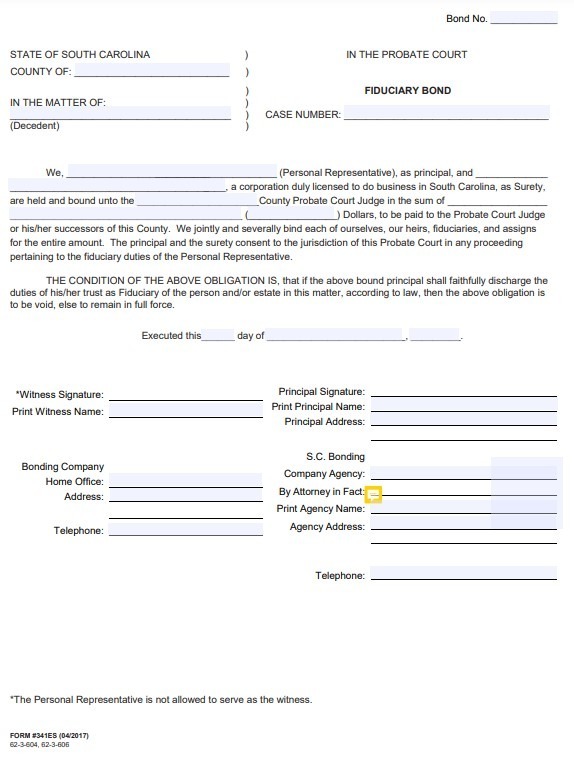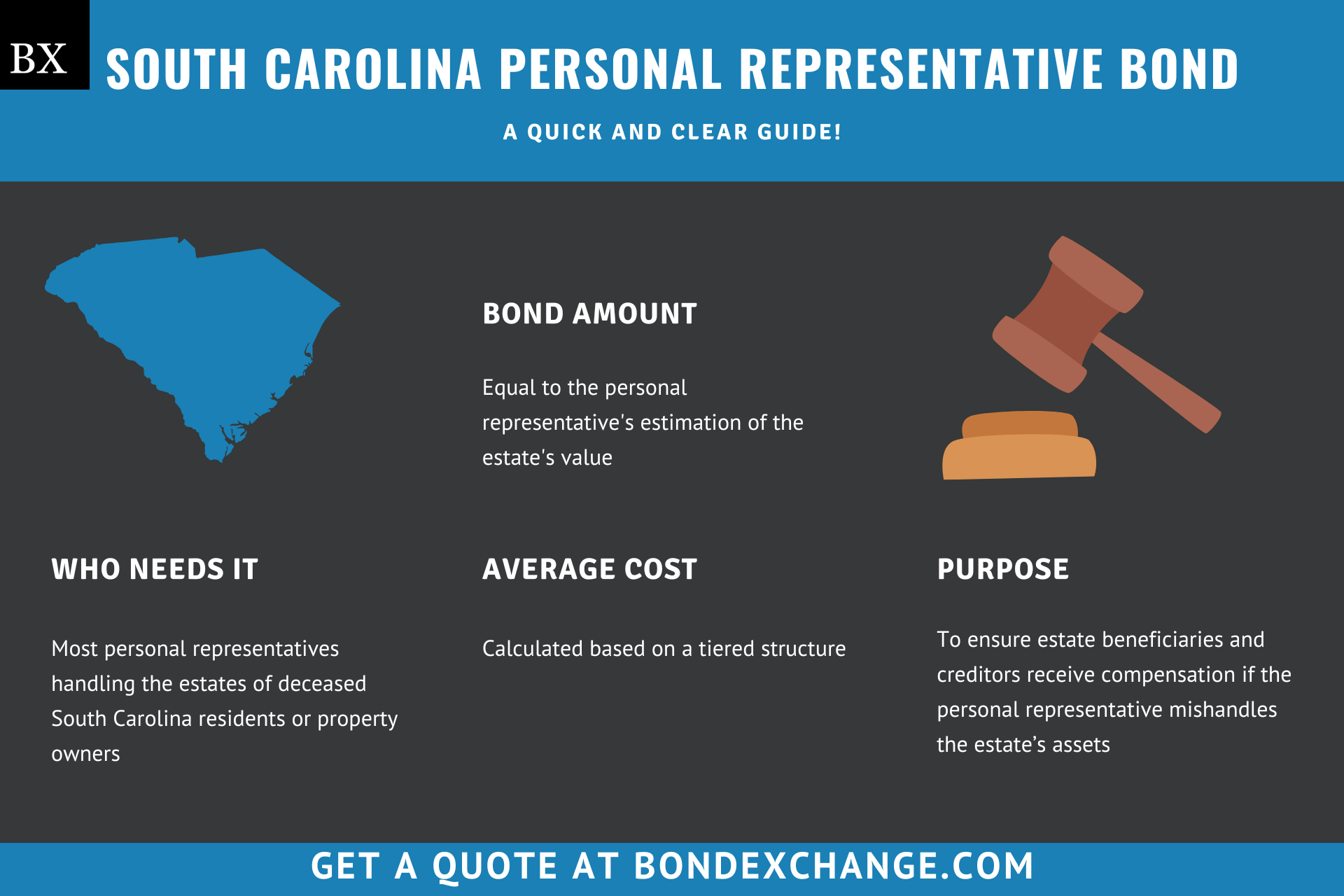South Carolina Personal Representative Bond: A Comprehensive Guide
This guide provides information for insurance agents to help their customers obtain a South Carolina Personal Representative bond.
At a Glance:
- Lowest Cost: Calculated based on a tiered structure
- Bond Amount: Determined on a case-by-case basis (more on this later)
- Who Needs it: Most personal representatives handling the estates of deceased South Carolina residents or property owners
- Purpose: To ensure estate beneficiaries and creditors receive compensation if the personal representative mishandles the estate’s assets
- Who Regulates Personal Representatives in South Carolina: The probate court with jurisdiction over where the deceased individual resided or had property

Background
South Carolina Statute 62-3-601 et seq. requires all personal representatives of an estate to be appointed by a probate court before assuming their fiduciary duties. The South Carolina legislature enacted the appointment requirement to ensure that personal representatives do not mismanage the estate’s assets. To provide financial security for the enforcement of this requirement, most personal representatives must purchase a probate surety bond to be eligible for appointment.
What is the Purpose of the South Carolina Personal Representative Bond?
South Carolina requires personal representatives to purchase a surety bond as a prerequisite to being appointed as a fiduciary over an estate’s assets. The bond ensures that the estate’s beneficiaries and creditors will receive compensation for financial harm if the personal representative fails to abide by the regulations outlined in South Carolina Statute 62-3-606. Specifically, the bond protects beneficiaries and creditors if the personal representative fails to adhere to all court orders or mismanages the estate’s assets. In short, the bond is a type of insurance that protects the estate’s beneficiaries and creditors if the personal representative violates their fiduciary duties.
How Can an Insurance Agent Obtain a South Carolina Personal Representative Surety Bond?
BondExchange makes obtaining a South Carolina Personal Representative bond easy. Simply login to your account and use our keyword search to find the “Probate” bond in our database. Don’t have a login? Gain access now and let us help you satisfy your customers’ needs. Our friendly underwriting staff is available by phone (800) 438-1162, email or chat from 7:30 AM to 7:00 PM EST to assist you.
At BondExchange, our 40 years of experience, leading technology, and access to markets ensures that we have the knowledge and resources to provide your clients with fast and friendly service whether obtaining quotes or issuing bonds.
Not an agent? Then let us pair you with one!

Click the above image to find a BX Agent near you
How is the Bond Amount Determined?
South Carolina Statute 62-3-604 dictates that if the will does not specify the bond amount, then the personal representative must estimate the estate’s total assets and income to be generated over the year. The bond amount must be equal to this estimation. Additionally, the same statute grants the court the authority to increase the required amount if deemed necessary or reduce it if the personal representative deposits any assets with a domestic financial institution.
What are the Underwriting Requirements for the South Carolina Personal Representative Bond?
Most surety companies will examine the following factors when determining eligibility for the South Carolina Personal Representative bond:
- Personal representative’s credit history (not considered for bonds with limits less than $25,000)
- Whether or not the estate has an attorney (not considered for bonds with limits less than $25,000)
- How long the fiduciary appointment is for
- Whether or not the personal representative is replacing a prior fiduciary
- If the personal representative has ever committed a felony
- If there are disputes among the estate’s beneficiaries
- Whether or not there is any ongoing business in the estate
- If the bond is being required by a creditor
How Much Does the South Carolina Personal Representative Bond Cost?
Surety companies typically determine the premium rate for personal representative bonds based on a tiered structure. As a result, larger bond amounts will be charged a lower premium rate than smaller bonds.
The following table illustrates the pricing structure for the South Carolina Personal Representative bond:
$1,500,000 Personal Representative Bond Cost
| Bond Amount | Premium Rate | Total Bond Cost |
|---|---|---|
| First $20,000 | 0.75% | $150 |
| Next $40,000 | 0.60% | $240 |
| Next $140,000 | 0.50% | $700 |
| Next $300,000 | 0.375% | $1,125 |
| Next $1,000,000 | 0.25% | $2,500 |
| Total cost of $4,715 |
Who is Required to Purchase the Bond?
South Carolina requires personal representatives to purchase a surety bond as a prerequisite to being appointed as a fiduciary over an estate’s assets. To paraphrase South Carolina Statute 62-1-201, a personal representative is a court-appointed fiduciary responsible for administering a deceased individual’s estate
Personal representatives are exempt from the bond requirement if:
- If all heirs and persons inheriting property waive the bond requirement
- The personal representative is the sole heir or beneficiary of the estate
- The personal representative is named in the will (unless the will requires a bond)
- The estate’s assets are less than $25,000
- The estate’s assets are sufficient to pay all claims made against it
- The personal representative pledges agrees to be held personally liable to any beneficiary or creditor of the estate for any acts of fraud or misconduct
BondExchange now offers monthly pay-as-you-go subscriptions for surety bonds. Your customers are able to purchase their bonds on a monthly basis and cancel them anytime. Learn more here.
How do Personal Representatives Become Appointed in South Carolina?
Personal representatives in South Carolina must navigate several steps to become court-appointed fiduciaries. Below are the general guidelines, but applicants should refer to South Carolina’s probate statutes for details on the process.
Step 1 – Determine Priority
South Carolina grants priority to persons seeking to act as personal representatives in the following order:
-
- Persons nominated in the will
- The deceased’s spouse if the will makes a gift to him/her
- Any person that receives a gift under the will
- The deceased’s spouse even if the will does not make a gift to him/her or if there is no will
- Any of the deceased’s heirs
- Any of the deceased’s creditors if it has been more than 45 days since their death
- Any person suitable to the court if it has been more than 4 months since their death
Persons with priority may nominate another individual to serve as the personal representative unless otherwise stated in the deceased’s will.
Step 2 – Hire an Attorney
Although not required, it is highly recommended that personal representatives hire an attorney to assist with the probate process.
Step 3 – Determine the Probate Type
South Carolina has three different probate processes, as outlined below:
-
- Informal: Allows personal representatives to administer an estate with minimal court supervision. A hearing is not required to initiate informal probate.
- Formal: The court closely monitors the probate process, and a hearing must be conducted before initiating it. Formal probate is most often needed if the will has erasures, white out, or other markings on it or if there is a dispute among the heirs.
Step 4 – Contact the Probate Court
Applicants must contact the probate court of the county with jurisdiction over the deceased’s estate. A representative of the court will walk the applicant through the probate process and provide them with all required forms that must be submitted. Personal representatives initiating informal probate proceedings can expect to obtain their appointment relatively quickly, while personal representatives involved in the formal probate process will have to wait until the hearing is concluded before administering the estate.
Step 5 – Purchase a Surety Bond
Unless otherwise exempt, personal representatives must purchase and maintain a surety bond (limits outlined above).
How do South Carolina Personal Representatives File Their Bonds?
Personal representatives should submit their completed bond forms, including the power of attorney, to the probate court with jurisdiction over the estate.
The surety bond requires signatures, including witness signatures, from both the surety company that issues the bond and the applicant. The surety company should include the following information on the bond form:
- Legal name and address of the entity/individual(s) buying the bond
- Surety company’s name, address, and phone number
- Name of the probate judge overseeing the case
- Bond amount
- Date the bond is signed
What can South Carolina Personal Representatives do to Avoid Claims Made Against Their Bonds?
To avoid claims against their bonds, personal representatives in South Carolina must ensure that they:
- Perform all of their fiduciary duties
- Obey all court orders
- Do not mismanage the estate’s assets

